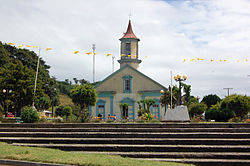Carelmapu (lit. from Mapudungun "Green Land") is a port and town (Spanish: pueblo) at the western end of Chacao Channel, southern Chile. Carelmapu was established by the Spanish in 1602 as San Antonio Ribera de Carelmapu following the Destruction of Seven Cities. In 1643 Carelmapu was sacked and its church vandalized by the Dutch corsair Hendrick Brouwer.[2][3] On March 6, 1676 Carelmapu received the exhausted survivors of Pascual de Iriarte's expedition to the Strait of Magellan.[4]
Carelmapu | |
|---|---|
 Church of Carelmapu | |
 | |
| Coordinates: 41°44′45″S 73°42′23″W / 41.74583°S 73.70639°W | |
| Region | Los Lagos |
| Province | Llanquihue |
| Municipality | Maullín |
| Commune | Maullín |
| Government | |
| • Type | Municipal |
| • Alcade | Jorge Westermeier Estrada |
| Elevation | 5 m (16 ft) |
| Population (2002[1]) | |
• Total | 2,903 |
| Time zone | UTC−04:00 (Chilean Standard) |
| • Summer (DST) | UTC−03:00 (Chilean Daylight) |
| Area code | Country + town = 56 + 65 |
Fort system
editDuring colonial times Carelmapu was the site of a small fort system made up of Fuerte de Carelmapu just west of Carelmapu, the sentinel outpost of Astillero and the battery of Coronel. The last two were not located in Carelmapu proper but further east along the northern shores of Chacao Channel. The original Fuerte de Carelmapu was built in wood in 1603. At present remnants of it can be found in a deteriorated state.[5]
References
edit- ^ Chile: Ciudades, pueblos, aldeas y caseríos, Instituto Nacional de Estadísticas, June 2005, retrieved January 10, 2014
- ^ Lane, Kris E. (1998). Pillageing the Empire: Piracy in the Americas 1500–1750. M.E. Sharpe. p. 89. ISBN 9780765630834.
- ^ de Rosales, Diego (1878). Vicuña Mackenna, Benjamín (ed.). Historia general de el reyno de Chile. Flandes indiano (PDF) (in Spanish). Vol. III. Valparaíso: Imprenta de El Mercurio. pp. 219–220.
- ^ de Vea, Antonio (1886). "Expedición de Antonio de Vea". Anuario Hidrográfico de la Marina de Chile (in Spanish). Valparaíso. p. 587.
{{cite book}}: CS1 maint: location missing publisher (link) - ^ Sahady Villanueva, Antonio; Bravo Sánchez, José; Quilodrán Rubio, Carolina (2011). "Fuertes españoles en Chiloé: las huellas de la historia en medio del paisaje insular" (PDF). Revista INVI. 73 (26): 133–165. doi:10.4067/S0718-83582011000300005. Retrieved 30 January 2016.